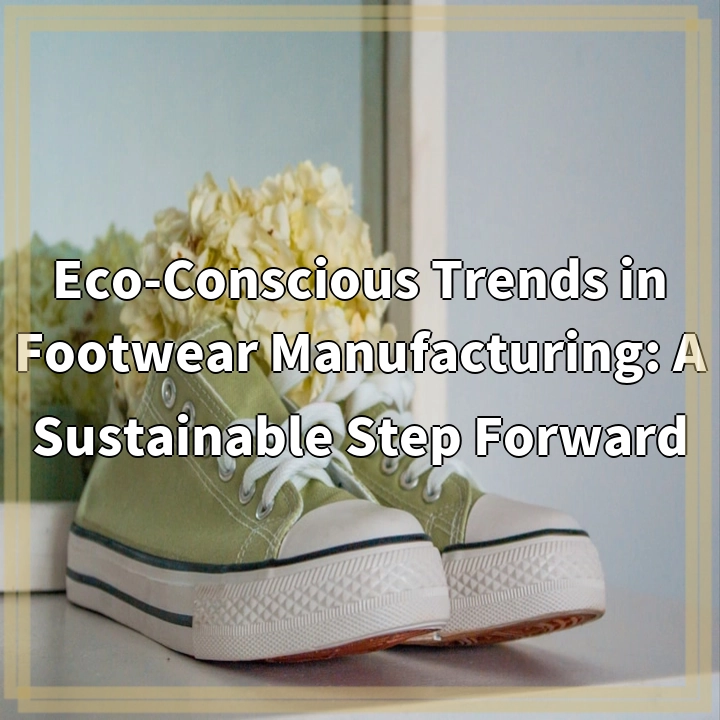Physical Address
304 North Cardinal St.
Dorchester Center, MA 02124
Physical Address
304 North Cardinal St.
Dorchester Center, MA 02124

Eco-Conscious Trends in Footwear Manufacturing are gaining momentum as the shoe industry strives to adopt sustainable practices throughout the production process. These trends aim to minimize the environmental impact of manufacturing and promote ethical and responsible practices.
The adoption of eco-conscious trends in footwear manufacturing faces several challenges:
One of the primary challenges is finding and sourcing sustainable materials for shoe production. Traditional manufacturing heavily relies on materials derived from fossil fuels, such as PVC or polyurethane. Manufacturers face the complex task of finding eco-friendly and durable alternatives.
Footwear manufacturing involves a complex supply chain, making transparency crucial. From sourcing raw materials to manufacturing and transportation, ethical practices, fair labor conditions, and minimal environmental impact must be ensured. However, achieving transparency can be challenging without suppliers prioritizing sustainability.
Sustainable materials and practices often come with higher costs, posing a challenge for manufacturers. Striking a balance between producing eco-conscious footwear and keeping prices affordable for consumers is necessary. Many consumers still prioritize affordability over sustainability, requiring cost-effective sustainable solutions.
Consumer demand for specific shoe styles and trends can hinder the adoption of eco-conscious practices. Fast fashion and the desire for new shoes contribute to overproduction and increased waste. Educating consumers about the environmental impact of their choices and promoting sustainable fashion trends is essential.
Shoe production generates significant waste in terms of materials and discarded shoes. Effectively managing waste through recycling programs and developing biodegradable or recyclable materials is a critical challenge. However, proper disposal and recycling remain problematic due to infrastructure limitations and lack of awareness.
Addressing the challenges associated with eco-conscious trends in footwear manufacturing requires a thoughtful and holistic approach. Here are some potential solutions:
Investing in research and development is crucial for discovering and refining sustainable materials for footwear production. Exploring plant-based alternatives, recycled materials, and biodegradable options can reduce reliance on non-renewable resources and minimize the environmental impact.
Working closely with suppliers and engaging in open dialogue about sustainability goals ensures transparency and ethical practices throughout the supply chain. Establishing standards and certifications demonstrates a commitment to sustainable sourcing and builds trust with environmentally-conscious consumers.
Embracing innovation and technological advancements enables the development of more sustainable manufacturing processes. Energy-efficient machinery, water-saving techniques, and new production methods that reduce waste can be adopted. Automation and digitization can streamline processes and reduce the environmental footprint.
Educating consumers about the environmental impact of their footwear choices is essential. Sustainable fashion campaigns, transparent labeling, and initiatives to promote eco-conscious consumer behavior can shift preferences towards more sustainable footwear options. Emphasizing the durability and longevity of products encourages consumers to prioritize quality over quantity.
Implementing circular economy practices within footwear manufacturing can address waste and end-of-life shoe disposal issues. Designing shoes with recyclability in mind, creating take-back programs, and exploring innovative recycling technologies minimize landfill waste and promote a more circular approach to production.
By adopting these solutions and embracing sustainable practices, the footwear industry can take a sustainable step forward in eco-conscious trends in manufacturing.
Keywords: eco-conscious trends, footwear manufacturing, sustainable practices, sourcing sustainable materials, supply chain transparency, balancing sustainability with affordability, consumer preferences, waste management, research and development, collaboration, innovation, raising consumer awareness, circular economy practices.
If you’re wondering where the article came from!
#